
On October 13, the 10 candidates running for seats in the Bellevue City Council discussed how they would tackle the city’s housing and affordability issues in a forum hosted by the Eastside Housing Equity Coalition.
It will be no easy feat for whoever wins. With the median home sale price sitting at just under $1.5 million, Bellevue is one of the least affordable places to live in the state, outstripping Seattle by a wide margin.
Up for election in Bellevue are:
- Position 1: Paul Clark and (appointed) incumbent Vishal Bhargava;
- Position 2: Naren Briar and incumbent Conrad Lee;
- Position 4: Pradnya Desh and incumbent Jared Nieuwenhuis;
- Position 5: Matthew Rish and (appointed) incumbent Claire Sumadiwirya, and
- Position 6: incumbent Mayor Lynne Robinson and Nicole Myers.
The Urbanist has endorsed Bhargava and Sumadiwirya.
Community health and stability through anti-displacement
All candidates agreed that the city needed more affordable housing, but they didn’t all agree on how to best go about creating said affordable housing.
Several candidates noted that this is particularly important for Black, brown, and Indigenous communities, who continue to suffer displacement, thanks to policies that have intentionally undermined any wealth-building ability. It is also harder for families from these communities to buy and rent, in the first place, due to racism and discrimination.
Sumadiwirya, an immigrant herself, said that there is overlap between historically marginalized communities and the professions that don’t currently allow people to live in the city.
“I’ve seen how housing instability cascades to job loss, educational disruption, and health crisis every day. This is not just a topic to me,” she said. In addition to continuing affordable housing projects, she said, it is important that Bellevue “create pathways for homeownership of community historically being discriminated from the lending process.”
Bhargava said that the city needed to “invest equitably, directing resources to neighborhoods that have historically been left behind, improving sidewalks, access to transit, [and] housing affordability, where the need is the most.”
Briar noted that the median price of Bellevue’s roughly 520 listings on the market was $1.5 million, and said that this spoke to the need to create more housing supply. She believes in “empowerment through ownership,” and said that many people she has spoken with, particularly elders, can neither afford to downsize their homes nor stay in Bellevue.

“And so they end up going to Snoqualmie, North Bend, or other cities. They’re displaced by their own city,” Briar said. “We have to implement new configurations of homes that allow various options at various costs.”
She also said that during the housing land use code amendment vote, Lee was asking what “walkability” and “stacked flats” meant.
“Well, once again, my opponent’s attacking me —” Lee began, before host Scarleth Lever cut him off to remind him that it was not a debate. Lee said that, as an immigrant, he understands what it is like not to be able to afford to live somewhere, and that he believes people who could not currently afford housing deserved “a seat at the table.”
Desh highlighted the need to “publish a clear dashboard” that shows how quickly affordable, transit-oriented development is happening within the city “so that we stay accountable and fix bottlenecks fast.”
Myers said that she believes that it’s important for the city to maintain the affordable developments already in the pipeline, as it goes through the changes imposed by the Housing Opportunities in Mixed-Use Areas (HOMA) land use code amendment.
“People living in affordable housing should be [able to stay in their homes] and it’s the rents that should fluctuate, not the other way around,” Myers said. “So as your income goes up, hopefully you still maintain eligibility for the housing and you don’t have to leave, even if you’re now able to pay more.”
Myers also agreed with Desh, and said that this kind of data can help families understand “how long it takes a family like yours to obtain housing just so you can plan for it and figure out what’s likely to happen to you.” She also said that the city needs to keep data on rental losses, “because we know that with some of the changes and development that’s happening, people are already getting displaced from longtime rental homes.”

Myers has been less than supportive of plans to create middle housing near transit, stating that even just nineplexes are “too many” homes for Bellevue’s transit areas. She has also supported retaining surface parking lots near transit-oriented developments, claiming they would act as buffers between pedestrians and busy arterial roads. (Update: Myers later expanded on her parking and rezoning thinking in this blogpost.)
In response to whether the city should create more east-west bike connections in the city, Myers told cyclists that they should just take their bike on a 2 Line train.
Supportive services and homelessness response
Nieuwenhuis avoided giving any substantive answer to Lever’s question about how he would navigate “strong public opinion against new revenue and the use of funds for low-income housing or homelessness responses,” instead stating that Bellevue residents want “a plan, a budget, a timeline, and clear metrics to evaluate the success of any program, and they want to be included. So it really starts with transparency and results.”
His opponent, Desh, said that she respected taxpayer concerns, and that the goal of building affordable housing remained paramount. She said that, as a startup founder, she is used to doing more with less, and outlined a clear plan to navigate negative public opinion.
“So,” Desh continued, “we prioritize existing dollars first, run pilot projects with sunset clauses, and use pay-for-performance contracts. Then, we publish clear dashboards, time to permit, cost per unit, school stability, and exits from homelessness. Then, when people see results, accountability builds trust, and that’s how we deliver transit-linked affordable housing.”
The candidates who followed Desh largely agreed with the dashboards idea, in the interest of transparency.
Lee took a step back, however, and appeared to suggest slowing down the creation of supportive housing and homelessness response services. He said that the city needed to have “responsible fiscal prudence” and “money to invest.”
“It’s an important area that we need to invest, so there’s no question about it, but we need to make sure the public is willing to understand what we’re investing in,” he said. “We need to be mindful of everybody’s working together, and we need to know how the money is spent, and we’ll continue to work on that. We have sources from everywhere, but we’re going to keep on looking at them, and this is proactive. Otherwise, Bellevue would not be the way it is today, unless we’re proactive.”
During the five-second “yes or no” round, Lee, Clark, and Robinson all attached conditions to inclusionary zoning. Clark and Lee both said inclusionary zoning should not be mandatory, and Robinson said that she supports inclusionary zoning only if it came with on-site performance metrics.
Sustaining permanent supportive housing in the face of federal cuts
Lever noted that Medicaid is a key funding source for permanent housing operations. She asked candidates how they would ensure permanent supportive housing, emergency shelters and homelessness-related services could continue, in the face of sharp federal cuts.
Desh opened her answer with an anecdote: Three times, she said, she opened her home to families who were about to experience homelessness.
“And each time I gave them free access to my house’s basement apartment because I just can’t allow something like this to happen whenever there’s something I can personally do about it,” she said.
At a citywide level, her number one strategy is “care with accountability.” This means building where services and transit already exist and using reliable sources to fund operations.
“For sustainability, use operating funds such as the already mentioned [House Bill] 1590, housing stability dollars, ARCH project-based vouchers, Medicaid billable behavioral health — the part that still does exist — and use multi-year, outcome-based contracts so providers can retain staff,” Desh said. “Every site, of course, needs to have a good neighbor agreement and those agreements need to be enforced with 24-7 staffing, safety.”
Her opponent, Nieuwenhuis, said that he supports continued community partnerships with organizations like The Sophia Way and LifeWire.
“I believe that housing stability means preventing homelessness before it even happens,” Sumadiwirya said, and underscored her support for emergency rental assistance and rapid rehousing. She also highlighted wraparound support, such as childcare, transportation to a job that is nearby, and readily available mental health services.
Bhargava agreed with the need for permanent supportive housing, as well as the need to prevent homelessness, rather than just respond to it. He also said that the city needed to ensure community safety: “these are not two different outcomes because we have to achieve both.”
“This means making sure that when we identify sites, we have early and open engagement with the community. We also need to set clear operational performance and safety targets,” Bhargava said, adding that any operating partners need to have available resources for onsite mental health support, drug use rehabilitation, and “even increase policing if we need to, to make sure that safety is getting addressed properly.”
Bhargava also advocated for onsite services for non-emergency events, in order to decrease police calls.
Clark took a more stringent tack, noting that the Bellevue Police Guild had endorsed him. He said that the city needs to revisit the “guardrails” that it “left on the table” when the council implemented HB 1195, which allowed the city to create permanent supportive housing.
Required minimum separation between sites, clear reporting standards — that was all left on the table,” Clark said. “I think we should revisit them. And when people raise concerns, we can’t just call them NIMBYs and move on. … Security and stability in these sites are crucial to those living in them, as well as those in the surrounding neighborhoods. Same goes for shelter facilities.”
Clark also noted that “recent events at PorchLight” — a man who had previously stayed at the homeless shelter beat a person to death in July at an encampment near the facility — have created an air of concern, and that the beating shows “the need for transparency and accountability there, and a focus on public safety.”
PorchLight is Bellevue’s only homeless shelter serving single adult men, and has been heavily targeted by right-wing commentators and not-in-my-backyard activists. Notwithstanding the murder this summer, a staff report from the Bellevue Office of Housing has noted overall crime and safety statistics show a positive trend in the vicinity since the facility began operating in 2023. Most of the calls to Porchlight have been for non-life-threatening emergency services.
Specific policies and trade-offs
In response to the specific affordable housing policies each candidate would bring to the table, several pointed to Bellevue’s Comprehensive Plan, overhauled last year after the legislature passed a state mandate that municipalities substantively address the state’s affordable housing crisis.
Briar said that she supported specific policies the city had already planned to implement, as outlined in its Comprehensive Plan. She listed several that were “all very exciting to me,” because they encouraged adding more and different types of homes in proximity to existing transit centers, schools, parks, and jobs.
In speaking to difficult trade-offs, she also pointed out that Lee voted against light rail routes “when 58% of the public voted in favor of it.”
“The aforementioned items of affordable housing, of neighborhood character — these things are not antithetical to one another. We build affordable housing by increasing the supply. It doesn’t have to be difficult,” Briar said, adding that things like investing in transit is how to retain neighborhood character.
“My opponent has been living in the city of Bellevue for less than two years. Just as a reminder,” Lee said, emphasizing his 50-year tenure in the city and more than 30 on the council. “How does she know what a Bellevue citizen wants? … I’ve been listening. I’ve been talking to you. … I listen to various opinions and accommodate them [to] make decisions. It’s not easy because people don’t think the same way.”
And though Lee didn’t miss the chance to say that he was “glad that my opponent has said a number of things the city is already doing,” he didn’t bring any new ideas of his own to the table, either. Instead, he stated that “the city has grown to such a scale that we have to make it work,” that this was difficult, and that “talking about it is one thing. Making it work is one thing. I’ve been on the council for all these years that we’ve been making it work.”
Part of the reason the state mandated that municipalities created affordable housing is because cities like Bellevue have not been making it work.
Myers pointed out that the city may face challenges when it comes to building in formerly single-family zones that are now cleared to hold multiple homes. She said it is important for both new community members and existing residents to build “as gracefully as possible,” ensuring tree retention and fitting all the necessary services into those areas.
Bhargava, who chaired the planning commission as it updated Bellevue’s Comprehensive Plan, also highlighted a few specifics he “had strong feelings for”: Encouraging mixed-use and middle housing near transit, schools, and parks; expanding affordable housing specifically near transit; and investing in pedestrian and bike connectivity throughout the city. He also supports a no net-loss approach to tree planting.
While she didn’t list any specifics, Sumadiwirya said that the city needs to center any difficult conversation with “a very clear north star.”
“For me, having a policy that’s focused on, that’s compassionate, consistent, and also committed, that puts our community first, should be the policy we put in the core of our growth and also our future planning,” Sumadiwirya said. “I remember when I first moved here 30 years ago, I didn’t see a teacher who looked like me. But now my kids can actually experience, learn new things with teachers who look like them. That is priceless. … When a policy is not made for the most vulnerable group, it’s not a policy for anybody.”
Sumadiwirya was the crucial swing vote in June that scaled back Bellevue’s middle housing plans in June. Those plans had gone beyond the state mandates, and appeared poised to make the city a leader in middle housing development.

